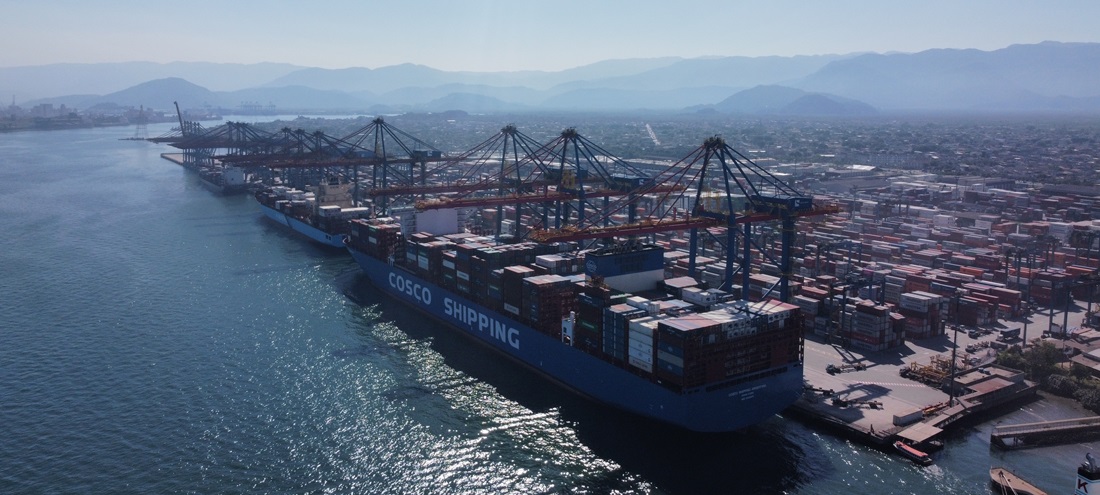
STJ Court Lifts Injunction Blocking Santos Port Authority from Managing Itajaí Port
Dec, 26, 2024 Posted by Denise VileraWeek 202450
The President of the Superior Court of Justice (STJ), Minister Antônio Herman de Vasconcellos e Benjamin, granted the Union’s request to suspend the effects of a preliminary injunction issued by Judge Ana Cristina Ferro Blasi of the Federal Regional Court of the 4th Region (TRF4).
The injunction, filed by the Federal Public Ministry, sought to block the termination of Delegation Agreement 08/97, which had transferred the management of the Port of Itajaí to the local municipality. The measure also aimed to halt the Santos Port Authority (APS) from executing a Ministry of Ports and Airports (MPor) directive to assume control of the Santa Catarina port.
The effort to extend the delegation agreement by an additional 12 months and prevent federal management of the Port of Itajaí originated with the Metropolitan Forum of the Itajaí-Açu River Mouth. The organization opposes federalization and the transfer of the port’s administration from the Municipality of Itajaí to the federal government. This position is supported by the current Santos Port Authority leadership. The local management of the port had been in place since 1997.
The forum argued that the federal government should implement a transition plan to ensure the continuity of port operations and investments before taking over. While the first-instance court denied the request for an injunction, the forum appealed to the Federal Court, leading to the TRF4 ruling in its favor.
In granting the injunction, Judge Blasi highlighted that transitioning management without a clear plan would violate the principle of trust protection. She cited correspondence between the Municipality of Itajaí and MPor requesting an extension of the delegation agreement, which had already been extended but was set to expire on January 1, 2025.
STJ Ruling and Minister’s Comments
Minister Herman de Vasconcellos, in his decision to suspend the injunction, emphasized that the issue of whether Itajaí should retain control of the port “should be addressed through appropriate legal channels.” He clarified: “It is not the role of this court to analyze strictly legal matters or determine whether the injunction granted on appeal should be overturned or upheld.”
The minister pointed out two key considerations: “First, the municipal entity, which is presumably the party most invested in extending the agreement, failed to bring the matter to court within the recommended timeframe.” He continued, “Second, the Union has presented evidence of a widely acknowledged crisis in the management of the Port of Itajaí, particularly over the last two years (2023 and 2024), coinciding with the delegation extension period.”
He further criticized the regional court’s decision, stating: “It is surprising that such a complex issue was addressed without first hearing the Union (the opposing party) and resulted in a ruling that imposed an obligation of non-performance, clearly interfering with administrative discretion. This decision raises questions about the often-blurred boundaries between judicial authority and administrative powers.”
The minister also expressed concern over the lack of practical analysis by the regional court, noting it relied “solely on abstract legal principles.” He warned of potential harm from the injunction, including “service disruptions caused by difficulties in leasing to operators, delays in dredging activities at the Port of Itajaí, and other operational issues.” He concluded that “a judicially enforced extension of the Delegation Agreement could jeopardize public order and harm the economy.”
In conclusion, the STJ President stated: “I grant the request to suspend the effects of the contested decision until the second-degree judgment of any appeal regarding the Civil Public Action no. 5041780-72.2024.4.04.7208.”
The Federal Government argued that, during the delegation period, it financed critical infrastructure improvements at the port, including the realignment of berths 3 and 4. It also raised concerns about inadequate facilities for handling bulk solids and liquids and highlighted strained relations with lessees, negatively impacting container throughput and labor relations.
Anderson Pomini, President of the Santos Port Authority, reaffirmed APS’s commitment to assisting the Port of Itajaí and aligning with MPor’s objectives. “We view all ports as part of Brazil’s port complex. They must grow, contribute to the country’s commercial flow, and support efficient export and secure import operations,” he stated.
In conclusion, the STJ President’s decision suspends the effects of the contested injunction until a second-degree ruling on any appeals in Civil Public Action no. 5041780-72.2024.4.04.7208.
Source: Santos Port Authority
-
Grains
Feb, 24, 2021
0
Paranaguá port starts to receive new soybean crop for export
-
OTI Rankings
Mar, 20, 2025
0
OTI Ranking | Dataliner | Jan. 2025 vs. Jan. 2025 Jan. 2024
-
Trade Regulations
Jun, 29, 2021
0
WTO fears retaliation against countries providing pandemic subsidies to companies
-
Shipping
Jun, 16, 2023
0
Brazilian gov’t to reassess coastal shipping regulations



